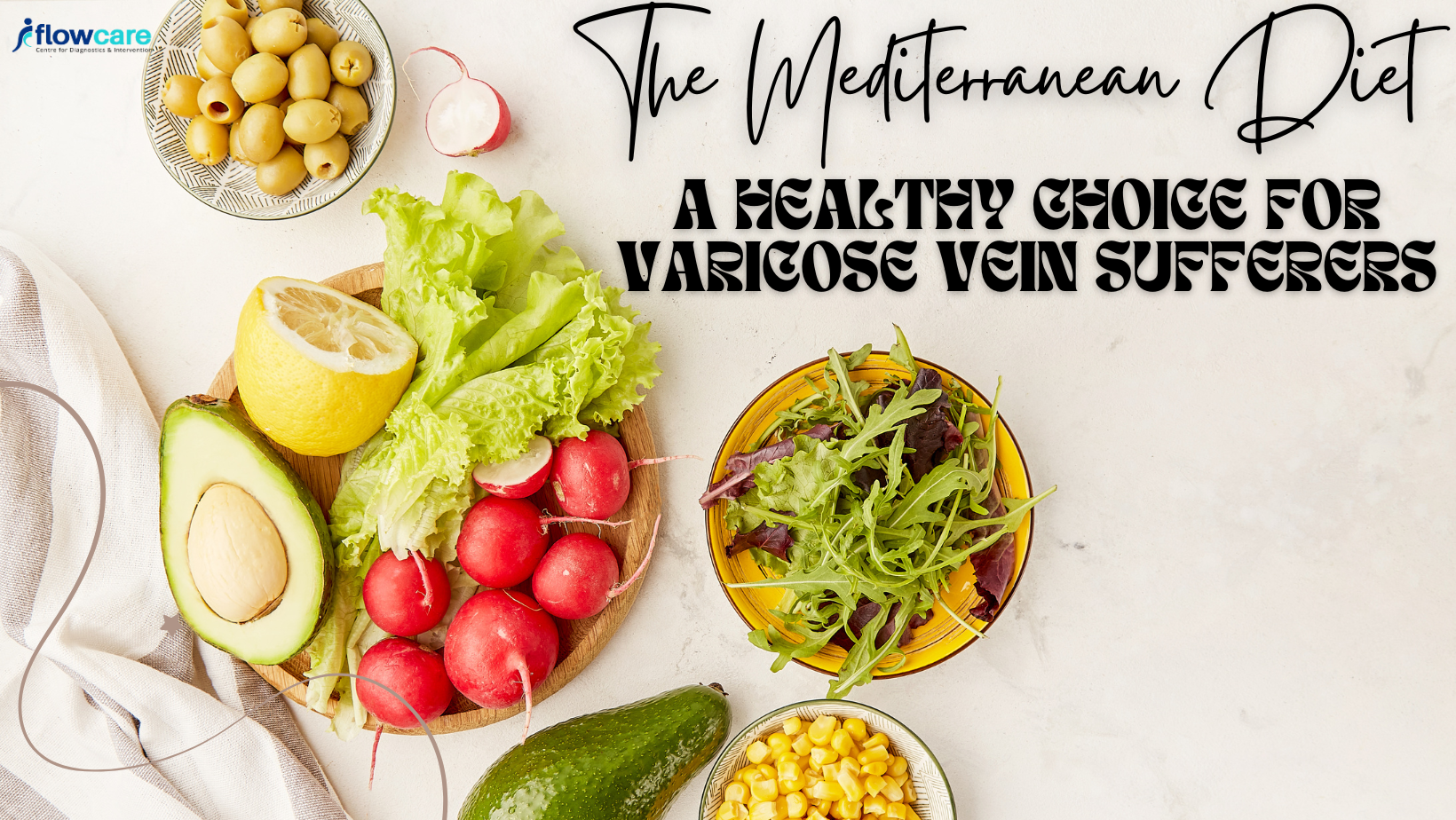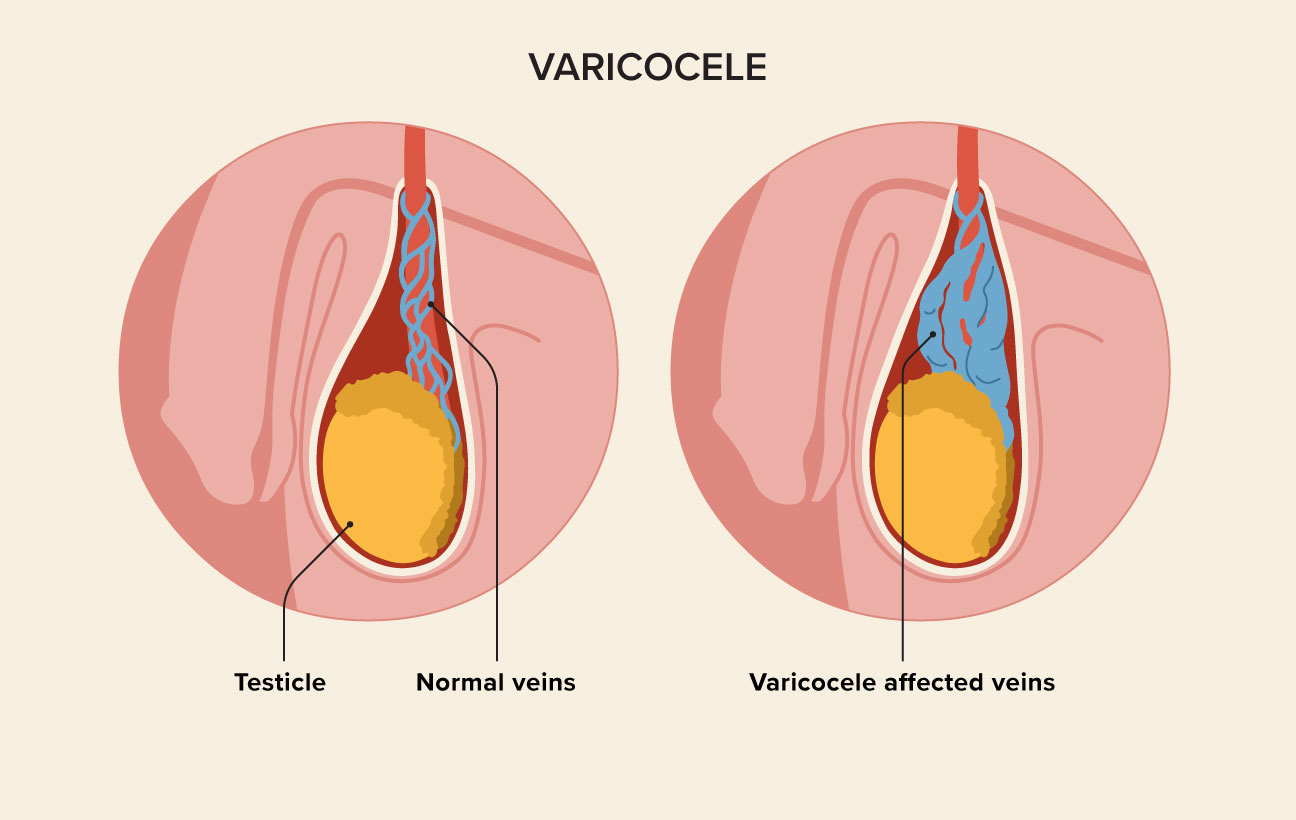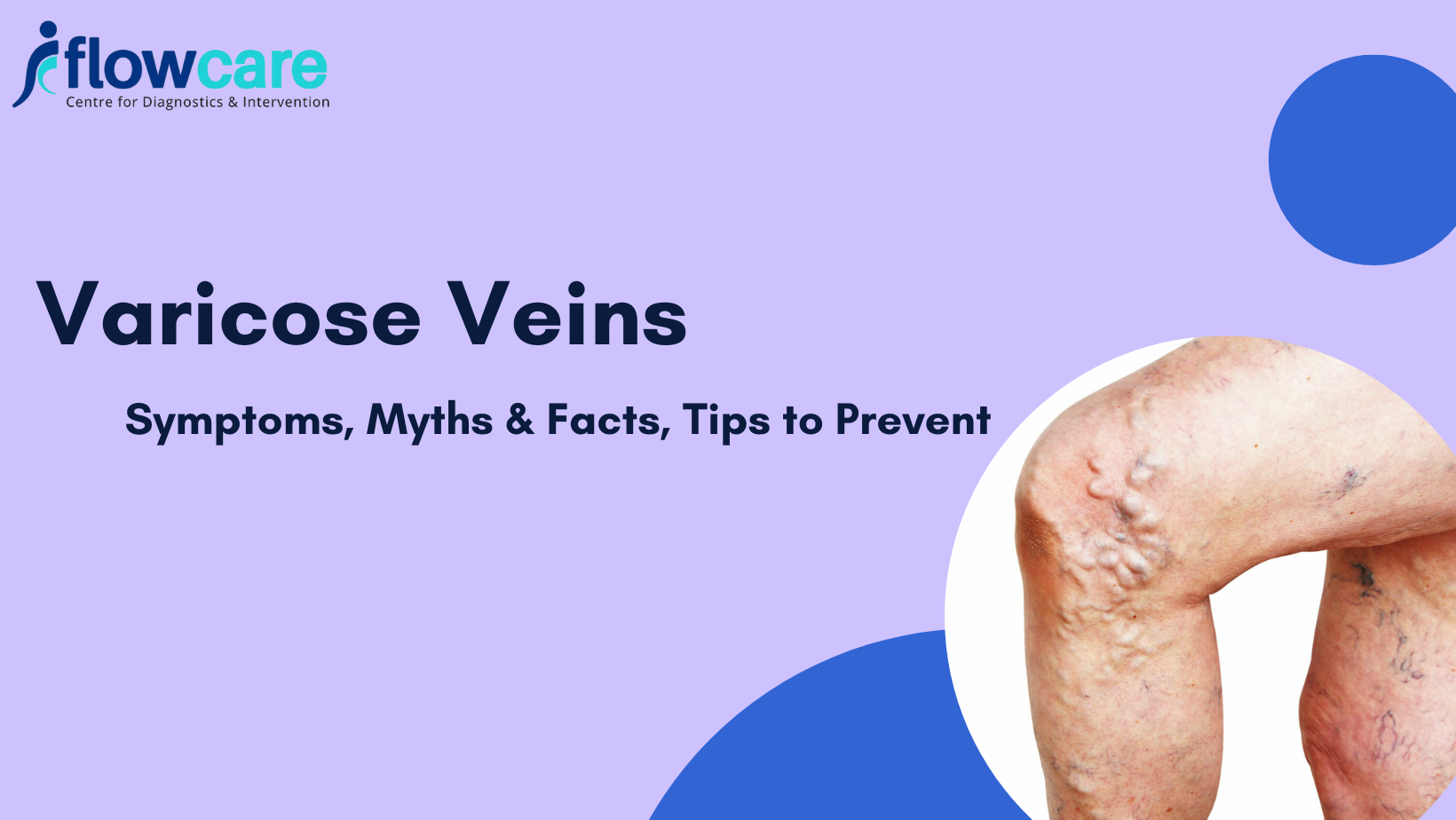
What are the warning signs of varicose veins?
The most common symptoms of varicose veins include:
- Swelling in the legs: Varicose veins can cause swelling in the legs due to the pooling of blood in the veins.
- Aching or heaviness in the legs: Varicose veins can cause a feeling of aching or heaviness in the legs, especially after standing or sitting for long periods of time.
- Leg cramps: Varicose veins can cause leg cramps, especially at night.
- Itching around the veins: Varicose veins can cause itching around the affected veins.
- Skin changes around the veins: Varicose veins can cause the skin around the veins to become discolored or thin, and can also increase the risk of skin ulcers.
- Burning or throbbing in the veins: Some people with varicose veins may experience a burning or throbbing sensation in the affected veins.
Myths versus Facts Related to Varicose Veins:
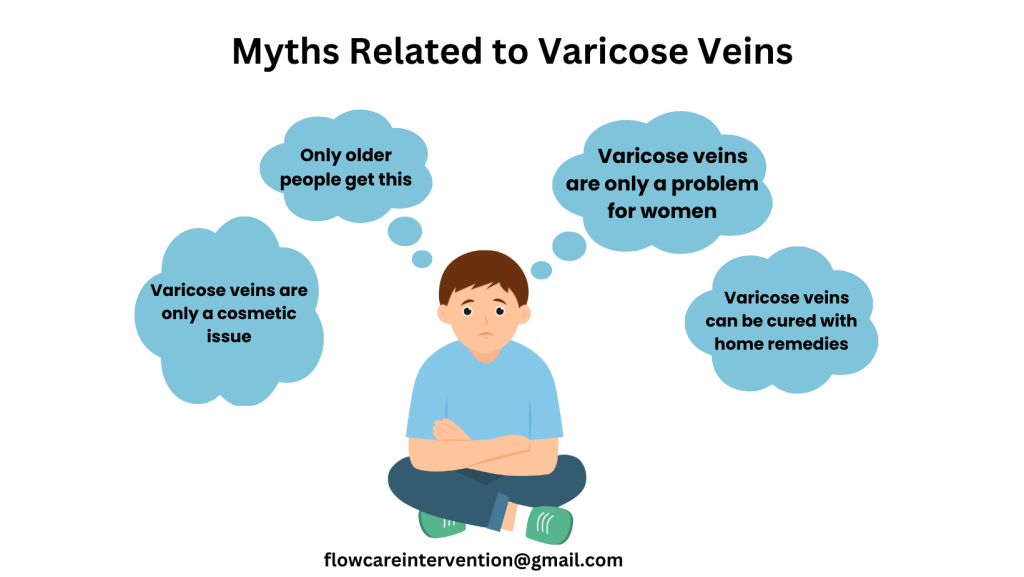
As with almost every disease, there are many myths related to varicose veins like believing that varicose veins only being a cosmetic issue or thinking that only older people get varicose veins or varicose veins being a result of wearing tight clothing or these can be cured with home remedies. However, the truth is that varicose veins can cause serious health problems and can affect people of any age.
Let us discuss and try to bust some of the most common myths related to varicose veins:
- Myth #1: Varicose veins are only a cosmetic issue.
Fact: While varicose veins may be unsightly, they can also cause serious health problems. Varicose veins can lead to aching, fatigue, and swelling in the legs, and can increase the risk of blood clots, skin ulcers, and other complications.
- Myth #2: Only older people get varicose veins.
Fact: While the risk of developing varicose veins increases with age, people of any age can develop them. Factors that can increase the risk of developing varicose veins include obesity, pregnancy, and a family history of varicose veins.
- Myth #3: Wearing tight clothing can cause varicose veins.
Fact: Tight clothing is not a cause of varicose veins. Varicose veins are caused by weakened valves in the veins that allow blood to flow backward and pool in the veins, leading to swelling and bulging.
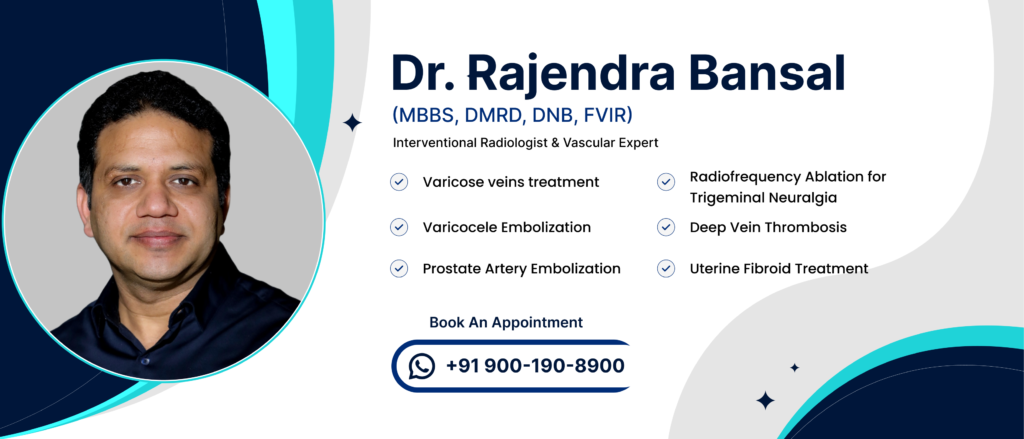
- Myth #4: Varicose veins can be cured with home remedies.
Fact: While some home remedies, such as wearing compression stockings or elevating the legs, can help alleviate the symptoms of varicose veins, they will not cure the condition. Treatment for varicose veins may include procedures to seal or remove the damaged veins, or medications to improve circulation.
- Myth #5: Varicose veins are only a problem for women.
Fact: While varicose veins are more common in women, men can also develop them. Both men and women can benefit from seeking medical treatment for varicose veins to reduce the risk of complications and improve their quality of life.
Varicose Veins During Pregnancy:
Varicose veins are very common during pregnancy and are caused by the increased pressure on the veins in the legs due to the weight of the growing baby. Hormonal changes that occur during pregnancy can contribute to the development of varicose veins. Pregnancy hormones cause the walls of the veins to relax and become less elastic, which can make it easier for blood to flow backwards and pool in the veins. This can cause the veins to become swollen, twisted, and enlarged, leading to the development of varicose veins. In addition, the increased weight of the growing baby puts extra pressure on the veins in the legs, which can further contribute to the development of varicose veins.
If you are pregnant and experiencing symptoms of varicose veins, it is important to see a healthcare provider for a proper diagnosis and treatment. Risks of developing varicose veins during pregnancy can be lessened with self-care measures listed below; however, it is also important to see your healthcare provider regularly during pregnancy to monitor your health and address any concerns you may have about varicose veins or other health issues.
Read More: Symptoms and signs of deep vein thrombosis
Prevention of Varicose Veins:
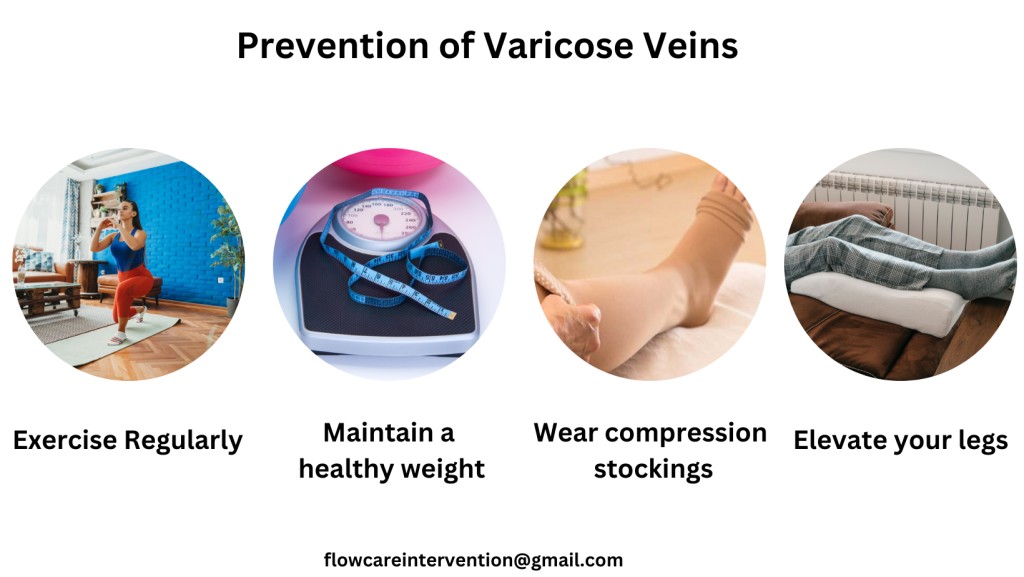
While varicose veins can be a sign of underlying health problems, there are several things you can do to help prevent varicose veins or reduce your risk of developing them. By taking the following simple lifestyle practices, you can help reduce your risk of developing varicose veins and the serious health problems that can be associated with them:
- Exercise regularly: Regular physical activity can help improve circulation and strengthen the muscles in your legs, which can help prevent varicose veins.
- Maintain a healthy weight: Being overweight or obese can increase the risk of developing varicose veins. Maintaining a healthy weight through a balanced diet and regular exercise can help prevent varicose veins.
- Avoid standing or sitting for long periods of time: Prolonged standing or sitting can cause blood to pool in your veins, increasing the risk of developing varicose veins. Try to take breaks and walk around periodically if you have a job that requires you to stand for long periods of time.
- Wear comfortable shoes: High heels can put extra pressure on your veins and increase the risk of developing varicose veins. Wear comfortable, flat shoes with good arch support to help prevent varicose veins.
- Avoid crossing your legs: Crossed legs can restrict blood flow and increase the risk of developing varicose veins. Avoid crossing your legs when sitting to help prevent varicose veins.
- Elevate your legs: Elevating your legs can help improve circulation and prevent varicose veins. Try to elevate your legs above heart level for at least 15 minutes a day to help prevent varicose veins.
- Wear compression stockings: Compression stockings can help improve circulation in your legs and prevent varicose veins. Talk to your doctor about whether compression stockings are a good option for you.
If you are experiencing any of the symptoms related to varicose veins, it is always advised to see a healthcare provider for a proper diagnosis and treatment. If left untreated or ignored, varicose veins can lead to serious health problems.




